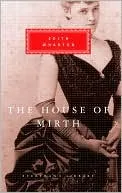 Notes on The House of Mirth, Book One, Chapters I-IX.
Notes on The House of Mirth, Book One, Chapters I-IX. Such an elegant setup in the first chapter: the introduction of Lily Bart and Lawrence Selden, the neatly handled exposition, and the seemingly incidental detail of the charwoman on the stairs. Maybe naming Selden's residence "the Benedick" is a shade heavy-handed -- that she is Beatrice to his Benedick is obvious on its own.
The point-of-view shift at chapter's end, from Selden to Lily, has an abruptness that might get a reprimand from a creative writing teacher. But we need Selden's awareness of Lily's skill at creating an image -- that both her discretions and her imprudences "were part of the same carefully-elaborated plan"; that her hair may have been "ever so slightly brightened by art"; that "she must have cost a great deal to make"; that "a fine glaze of beauty and fastidiousness had been applied to vulgar clay" -- to set up her regret that "one could never do a natural thing without having to screen it behind a structure of artifice." For Lily can't "do a natural thing" -- it is forbidden to her by the society in which she lives, the more so because of her lack of money.
The depth with which we enter both Selden's and Lily's consciousnesses also serves to highlight the shallowness of the other characters, such as Percy Gryce -- the superrich and ineffably dull collector of Americana on whom Lily decides to take "the bare chance that he might ultimately decide to do her the honour of boring her for life" -- and his mother, "a monumental woman with the voice of a pulpit orator and a mind preoccupied with the iniquities of her servants." Wharton's epigrammatic descriptions of her characters are brilliant: Mrs. Dorset is "like a disembodied spirit who took up a great deal of room." "Mrs. Peniston thought the country lonely and trees damp, and cherished a vague fear of meeting a bull."
"Misfortune," Wharton tells us, "had made Lily supple instead of hardening her, and a pliable substance is less easy to break than a stiff one." But it has also made her self-centered, a rebel without a cause other than her own, who "had never been able to understand the laws of a universe which was so ready to leave her out of its calculations." She is forced to put her trust in the one thing she believes she can rely on: "Her beauty itself was not the mere ephemeral possession it might have been in the hands of inexperience: her skill in enhancing it, the care she took of it, the use she made of it, seemed to give it a kind of permanence. She felt she could trust it to carry her through to the end." But as all of Western literature has drummed into us, beauty is not to be trusted.
It doesn't help that "poor Lily, for all the hard glaze of her exterior" -- there's that word "glaze" again -- "was inwardly as malleable as wax." Her problem lies in whether she will allow the right person to take advantage of that malleability. As she tells Selden, when she re-encounters him at Bellomont, "the people who find fault with society are too apt to regard it as an end and not a means, just as the people who despise money speak as if its only use were to be kept in bags and gloated over[.] Isn't it fairer to look at them both as opportunities, which may be used either stupidly or intelligently, according to the capacity of the user?" The trouble is that Lily doesn't use either society or money with great intelligence.
Lily is almost immediately punished for her decision to forgo church -- and therewith Percy Gryce -- and to enter into a conversation with Selden that turns into a beautiful Beatrice-and-Benedick duel of wit and emotional brinksmanship. And in her need for money, she makes an uninformed decision to trust Mr. Trenor, for which the punishment is likely to be even greater. She mistrusts Selden "because his presence always had the effect of cheapening her aspirations, of throwing her whole world out of focus," when that's precisely what needs to happen. For her aspirations are cheap: "She could not figure herself as anywhere but in a drawing-room, diffusing elegance as a flower sheds perfume."